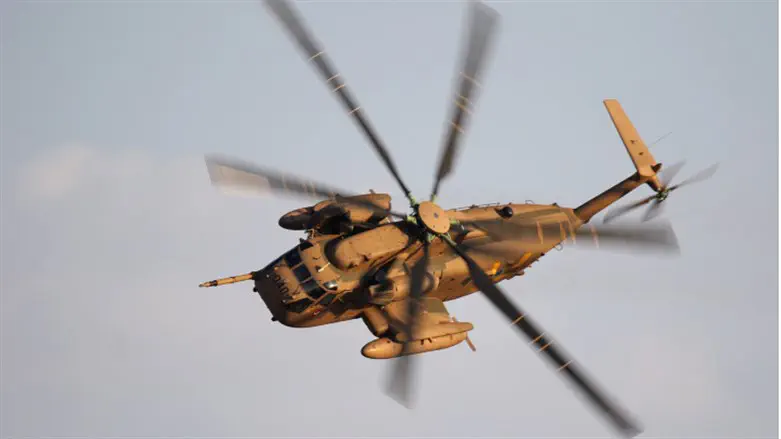
N., a Yasur helicopter pilot, recounted the actions he took on October 7, the day of Hamas' surprise attack on Israel.
In an interview Wednesday morning with Kan Reshet Bet, he recounted: "I was at home in Tel Aviv and I woke up early - I don't even know why. At seven I saw that the squadron commander sent me a message - come as soon as possible and bring your equipment, consider that it’s going to be for a while."
"I drove as fast as I could to Tel Nof, and throughout the ride I saw an unusual sight - a lot of rockets landing in the center, which we usually don't see in regular times.
"When I arrived at the squadron, they told me that the first task that needs to be carried out was to fly a force of paratroopers from Nebi Musa to the Gaza area - exactly how many, or where to land - it was not clear. As Yasur pilots, who are usually called to urgent incidents - we are used to situations, as in this case, with missing information, which we will complete while flying."
He recounted: "We arrived at Nebi Musa, and we saw that there were many more paratroopers than what we were supposed to take - than what the helicopter normally flies. At that moment, my first penny dropped regarding the situation down south and the magnitude of the event. We gathered the paratroopers and on the way we asked for some backup or escort for the landing, because we realized that it was going to be hot, with a lot of shooting around us. We were told that there wasn’t any - because all the aircraft in the air at the moment were concentrating on protecting the fence, and we were on our own. At that moment another penny dropped, that something much more extreme than we could have imagined is happening."
"On the way we were instructed to land at the Saad airstrip, and seconds before landing we were told that the airstrip was under threat of attack and that we had to land somewhere else. I thought to myself – 'How could it be threatened? This is our territory,' and once again my understanding of the magnitude of the event, and also the importance of time, was intensified. We continued to another airstrip in the Alumim area, on the way we witnessed an unusual spectacle of smoke rising everywhere, and a strong smell of fire in the settlements that we are so used to training over."
N. described: "We arrived at the new airstrip and the lead helicopter spotted some motorbikes - we said that it was probably the enemy, so we turned back and planned to land a hundred meters away, in a place hidden behind trees. Before landing, I saw that the lead helicopter had dropped one of his fuel tanks, which is an action done to announce an emergency situation. Seconds later the same helicopter pilot reported that it had been damaged and one engine had gone. We know how to land with one engine, but with such a heavy weight of so many fighters and while being shot at – this was really challenging."
"I didn't know the fate of the helicopter crew at the time, and at the same time my officer asked me what I was planning on doing - to land there or somewhere further away. At that moment it was clear that the forces were very essential in Be'eri and Alumim, and I even thought that while I still didn't really know the extent of the situation, these settlements could fall into the hands of Hamas, so we had to land in the area and fast. It was also clear to me that the lead helicopter would not be able to take off after that, and we would need to rescue them."
"We landed, the soldiers started running, and during this we received a report that we were all being fired at," N. recounted. "At the same time, rockets were falling very close to us in what felt like everywhere. In the meantime, we, the helicopter crew, were waiting for the second helicopter crew to arrive. I remember it like a scene from a movie - they turned off the helicopter, and ran towards us under fire, seconds later we heard a huge explosion and saw that a missile had hit the helicopter they had just got out of, 50 meters away from us."
"The team entered our helicopter and reported that the co-pilot of the other helicopter had been hit by a bullet and that we also had a leak from the tail in our helicopter - the worst thing that could happen. I say, 'all’s good, ready for takeoff,' and we try to get away from the area as quickly as possible. After we left, we realized that the helicopter malfunction was not as bad as we thought, and as for the wounded pilot - we dropped him off at Kaplan Hospital in Rehovot, and two hours later he was back on the ground fighting."

